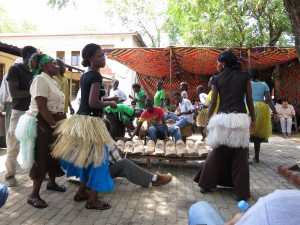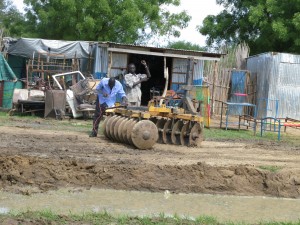The title of this post comes from an advocacy piece written by ELCA Missionary Stephen Deal entitled “Sin borda…no hay comida”. The phrase has become the rallying cry of communities who live along a 10 kilometer stretch of the Paz River in the southwest corner of El Salvador. These communities, including many Lutherans, have been affected by annual flooding, like that of last October where 10 days of torential rains led to heavy throughout Central America and especially along the Paz River.
Much of this flooding occurs due to the lack of a system of retaining dikes at key points along the Paz River – which serves as the border between El Salvador and Guatemala. The consequences are predictable and often tragic: destruction of crops, homes, roads, bridges, farm animals and even the loss of human life. To help lift up this issue the communties formed the Inter-Community Association for the Development of Southern Ahuachapan (ADICO) which has been adovacting Salvadorian authorities for these dikes since the massive flooding of Hurricane Mitch in 1998. Yet for the most part these pleas have fallen on deaf ears and efforts have fallen off.
After last years major flooding event the communities decided to redouble efforts with ADICO and have been blessed with positive results. The authorities were beginning to listen and actions were starting to take shape, like a dredging project to help mitigate some flooding. A great victory and step forward this action offers a short-term fix to a longer-term problem.
“We are tired of being treated as victims; tired of being the recipients of charity . . . we want to be listened to.” – Inter-Community Association for the Development of Southern Ahuachapan (ADICO) representative in El Salvador
The communities are continuing to advocate for a dike system or another alternative to bring a permanent, sustainable solution to the problem of flooding. The ELCA is helping in this important work of disaster risk reduction and preparedness, through generous gifts to our Disaster Response fund and continued relationships of support with our local companions as they work to fulfill the quote above, to move from victims and recipients to empowered citizens engaged in their own solutions.
I think Stephen sums it up best in the closing words of his article: “Thanks be to God for the dedication of ADICO and Lutheran church leaders as they work to bring a measure of peace and stability to the lives and livelihoods of everyone living in this part of El Salvador. Thanks be to God also for the opportunities we have to accompany them through our prayers, visits & offerings!”
Read Stephen’s Update No Borda…No Hay Comida
___________
Gifts to ELCA Disaster Response allow the church to respond locally and globally in times of need. Donate now.



